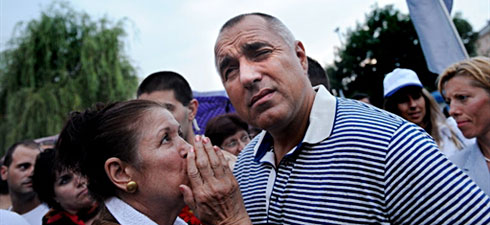At first glance it looked like a politician getting even with his archrival. Bulgaria’s new prime minister, Boyko Borisov, accused his predecessor, Sergey Stanishev of the Socialist Party, of spiriting away a classified report on corruption in 2008 in order to tip off his incriminated cabinet members. The public prosecutor’s office is now investigating not only Stanishev, but also an anonymous whistleblower who recently posted the state security agency’s (DANS) midyear report 2008 on the Web.
The document merely confirms what Western media and governments have already known for some time and what Sofia has tried to play down: the misappropriation of EU funds – with the blessing of top political circles –, rampant cronyism among crooks and politicians, and endless corruption. Ex-premier Stanishev was actually the one who had initiated the creation of the DANS agency in 2008, after scandals in the interior ministry and many officials’ underworld connections blighted Bulgaria’s image worldwide and led to cuts in EU aid.
EU funds plundered
The Bulgarian public seems rather at a loss. Does DANS simply present an unsparing picture of Bulgarian reality, or did the security agency – as new prime minister Borisov claims – serve as his predecessor’s personal “political police”? There may well be other reasons for the premier’s ire, however. The security report for the first half of 2009 is now in. And it was hardly kept under wraps this time around either, though many journalists had to promise in writing not to release it to the public.
The contents are sulphurous to say the last: EU funds have been plundered, especially in agriculture and thanks to the “corruptibility” of staff at the Sovereign Wealth Fund there, which is hardly vetted at all. Documents were forged or destroyed, or property deeds were made out in the names of dead souls, in order to get at the coveted EU subsidies. And not only Bulgarians help themselves to this financial grab bag. Greeks and Turks also buy or lease enormous estates in Bulgaria through local strawmen, since EU subsidies are calculated on the basis of acreage.
Hezbollah sets up camp in Bulgaria
In the health care sector, doctors and hospitals fabricate fictitious patients and siphon aid money off into other investments. Drug companies take advantage of their market monopoly to put price hikes across by stopping supplies of vital medication. In a word, the crooks use every trick in the book – and then some. Entrepreneurs who have embezzled funds or sorely mismanaged their business transfer their overindebted firms to cash-strapped, socially disadvantaged – usually Romany – strawmen, thereby dodging liability and any recourse to their personal assets. And it goes without saying that money launderers likewise feel safe in a country with such bendable laws, compliant courts and such a mobbed-up state apparatus.
Nor has much changed in the world of organised crime proper, where blackmail, kidnapping and intimidation have been the order of the day in Bulgaria for years now. The first signs of cross-border terrorism are also alarming: Shiite organisations like the Hezbollah have purportedly already set up bases in Bulgaria. A shambles, in a word, which Borisov had better clean up by year’s end if he is to present his administration as any more successful than his predecessor’s. Even the Bulgarian populace is losing patience with its politicians’ failure to take action.
Absent improvements in the next report, the country’s rapport with the EU is bound to cool off significantly. Brussels will wonder once again what yardstick it used back in 2007 to admit Bulgaria, now the most corrupt country in the Community. The new prime minister’s only realistic alternatives now are either to shut down – as announced – the inconvenient state security agency, adapt it to his political purposes, or make absolutely sure its future reports remain securely sealed in his desk drawer.
Was this article useful? If so we are delighted!
It is freely available because we believe that the right to free and independent information is essential for democracy. But this right is not guaranteed forever, and independence comes at a cost. We need your support in order to continue publishing independent, multilingual news for all Europeans.
Discover our subscription offers and their exclusive benefits and become a member of our community now!












